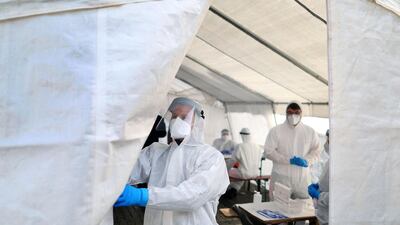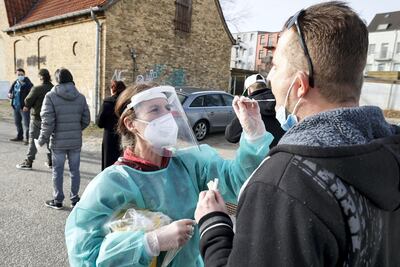Germany plans to spend nearly €1 billion ($1.21bn) a month on supplying coronavirus home tests to help the country out of lockdown.
The infection rate has fallen steadily since the start of the year but has stabilised in recent days, jeopardising plans to end the lockdown on March 7.
Much of Europe's largest economy was shut down in mid-December to contain a major surge in infections.
Germany on Wednesday approved three Covid-19 tests for home use, with more kits likely to be approved next month.
The government expects the scheme will cost up to €810miliion a month for 30 to 45 million tests.
The strategy comes as officials said Germany had administered only 15 per cent of its Oxford-AstraZeneca vaccine supply because of public perception that it was less effective than others. Chancellor Angela Merkel's spokesman Steffen Seibert on Wednesday urged people to trust the vaccine. "It will save lives," he said.
The country expects to receive 16 million doses of the Oxford-AstraZeneca vaccine between March and May, which could be fewer than the number agreed, according to a contract with the EU leaked last week.
It was reported that AstraZeneca was delivering about half the amount it was contracted with the EU to produce.
President of the European Commission Ursula von der Leyen called for the problems with vaccine supplies to be resolved.
"Vaccine manufacturers are our partners in this pandemic and they have also never faced such a challenge," she told German newspaper Augsburger Allgemeine. "New questions are always arising that we can generally resolve amicably."
In France, officials are keen to avoid another national lockdown despite a worrying rise in cases in several parts of the country.
"The situation is deteriorating and it is a source of worry in about 10 regional departments. Some regions require rapid and strong measures,” French government spokesman Gabriel Attal said.
The number of people being treated for Covid-19 in intensive care units in France reached 3,407 on Monday, exceeding 3,400 for the first time since December 3.
Czech Prime Minister Andrej Babis said the country must tighten restrictions to prevent a catastrophe. The country reported more than 15,000 new cases on Tuesday, the highest daily number since January 6.
The Czech Republic recorded 1,389 coronavirus patients in serious condition in hospital, a record for the country, leaving few spare beds.
"Hellish days await us," Mr Babis said, describing the situation as grave.
In other parts of Europe, however, public pressure to relax measures is building.

The Netherlands eased some lockdown restrictions in what Prime Minister Mark Rutte called a calculated risk to make the situation bearable, while Denmark allowed a partial return to classes for secondary school students.
In Belgium, Jean-Marc Nollet, leader of the Greens party that is part of the ruling coalition, said he no longer followed his own government’s limits on social contacts.
“I am a human being and human contact is something vital,” he said.


